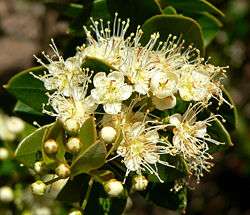Amomyrtus meli
| Meli | |
|---|---|
 | |
| Scientific classification | |
| Kingdom: | Plantae |
| (unranked): | Angiosperms |
| (unranked): | Eudicots |
| (unranked): | Rosids |
| Order: | Myrtales |
| Family: | Myrtaceae |
| Genus: | Amomyrtus |
| Species: | A. meli |
| Binomial name | |
| Amomyrtus meli (Phil.) D.Legrand & Kausel | |
Amomyrtus meli, known as Meli, is a species of tree endemic to Chile in the Myrtaceae family. It grows from Arauco to Chiloe (37 to 42°S). It grows mostly on moist and shaded sites.
Description
It is an evergreen tree or that measures up to 20 m (65 ft) tall and up to 60 cm (23 in) in diameter, smooth bark, decorticant, reddish-whitish color. The leaves are opposite, oval, lanceolate or elliptical with acute apex which ends in a mucro up to 1 mm long. The leaves are 2-5 long and 0.7-2.5 cm wide, the petioles are 2–4 mm long. Newly shoots are glabrous what make it different from Amomyrtus luma, species to which it resembles very much, The flowers are hermaphrodite, 5 fused sepals and 5 free white petals about 3–4 mm long. The stamens are numerous 40-80 and 5–7 mm long. The fruit is a black purplish-black berry, 5–8 mm in diameter, generally with 3 seeds about 3-4.5 mm.
Etymology
The name Amoyrtus from the Greek Amos; very fragrant, Myrtus is the family's name and Luma mapuche name of the tree.
Cultivation and uses
The wood is extremely hard and resistant and that is why it is used for elaborating tool handles, it is also planted as an ornamental tree because it blooms abundantly and is very fragrant. Its flowers are important for honey production.
External links
- "Amomyrtus meli". Enciclopedia de la Flora Chilena. Retrieved 2010-04-06.
- "Amomyrtus meli". Chilebosque. Archived from the original on 19 April 2010. Retrieved 2010-04-06.